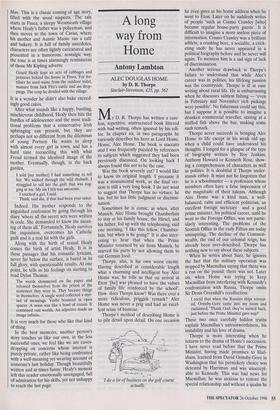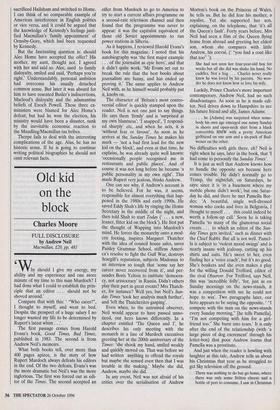A long way from Home
Antony Lambton
ALEC DOUGLAS HOME by D. R. Thorpe Sinclair-Stevenson, £25, pp. 562 Mr D. R. Thorpe has written a care- less, repetitive, unstructured book littered with bad writing, often ignored by his edi- tor. In chapter six, in two paragraphs he variously describes his hero as Lord Home, Home, Alec Home. The book is staccato and I was frequently puzzled by references to subjects which suggested they had been previously discussed. On looking back I always found this not to be the case.
Was the book severely cut? I would like to know its original length. I presume it was a monumental work, as the final ver- sion is still a very long book. I do not want to suggest that Thorpe has no virtues; he has, but he has little judgment or discrimi- nation.
Sometimes he is comic, as when, after Munich, Alec FrOme brought Chamberlain to stay at his family house, the Hirsel, and his father, fed up with the telephoning, said one morning, 'I like this fellow, Chamber- lain, but when is he going?' It is also inter- esting to hear that when the Prime Minister returned by air from Munich, he starved his party by not allowing them to eat German food.
Thorpe, alas, is his own worst enemy. Having described at considerable length what a charming and intelligent boy Alec Home was, he tells us that on arrival at Eton Vie] was pleased to have the values of family life reinforced by the school'. How does Thorpe know? Was there ever a more ridiculous, priggish remark? Alec Home was never a prig and had an excel- lent sense of humour.
Thorpe's method of describing Home is to pile detail upon detail. On one occasion `I do a lot of business on the golf course actually.' he even gives us his home address when he went to Eton. Later on he suddenly writes of people 'such as Cosmo Crawley [who] became regular house-party guests'. It is difficult to imagine a more useless piece of information. Cosmo Crawley was a brilliant athlete, a crashing bore, a socialite, a crick- eting snob: he has never appeared in a political biography before and he never will again. To mention him is a sad sign of lack of discrimination.
Another serious drawback is Thorpe's failure to understand that while Alec's career was in politics, his lifelong passion was the countryside. Thorpe is ill at ease writing about rural life. He is embarrassing when he discusses salmon fishing — 'even in February and November rich pickings were possible'. No fisherman could say this, but I suppose it is possible to imagine a drunken commercial traveller, staring at a stuffed fish above the bar, making some such remark.
Thorpe never succeeds in bringing Alec Home to life except in his weak old age when a child could have understood his thoughts. I longed for a glimpse of the type of biography written by Roy Jenkins, Anthony Howard or Kenneth Rose, show- ing a comprehension of characters as well as politics. It is doubtful if Thorpe under- stands either. It must not be forgotten that he is a schoolmaster — a profession whose members often have a false impression of the magnitude of their talents. Although Alec Home was a kind man, a well- balanced, calm and efficient politician, an excellent foreign secretary and a good prime minister, his political career, until he went to the Foreign Office, was not partic- ularly interesting. The problems of the Scottish Office in the early Fifties are today uninspiring. The decline of the Common- wealth, the end of our colonial reign, has already been over-described. Thorpe has nothing new to say about these subjects.
When he writes about Suez, he ignores the fact that the military operation was stopped by Macmillan saying that there was a run on the pound; there was not. Later on, when Home was trying to keep Macmillan from interfering with Kennedy's confrontation with Russia, Thorpe omits Sir Denis Greenhill's recollection: I recall that when the Russian ships retreat- ed, Ormsby-Gore came into my room and exclaimed, 'Thank God, they've turned back, just before the Prime Minister gave way!'
These two once carefully hidden truths explain Macmillan's untrustworthiness, his instability and his love of drama.
Thorpe is more interesting when he returns to the drama of Home's succession. I have never read before that the Prime Minister, having made promises to Hail- sham, learned from David Ormsby-Gore in Washington that his pernickety choice was detested by Harriman and was unaccept- able to Kennedy. This was bad news for Macmillan; he was anxious to restore the special relationship and without a qualm he sacrificed Hailsham and switched to Home. I can think of no comparable example of American interference in English politics or vice versa, and it could be argued that the knowledge of Kennedy's feelings justi- fied Macmillan's 'family appointment' of Ormsby-Gore, which had been requested by Kennedy.
But the fascinating question is: should Alec Home have accepted the offer? His mother, my aunt, thought not. I agreed with her and said so. Alec, used to family disloyalty, smiled and said, 'Perhaps you're right.' Understandably, personal ambition had overcome his usually detached common sense. But later it was absurd for him to have resented Butler's indiscretions, Macleod's disloyalty and the adamantine beliefs of Enoch Powell. These three ex- ministers were blamed for Alec Home's defeat; but had he won the election, his ministry would have been a disaster, sunk by the inevitable economic reaction to the Maudling/Macmillan tax bribes.
Thorpe fails to deal with the interesting complications of the age. Alas, he has no historic sense. If he is going to continue writing political biographies he should not omit relevant facts.



















































































 Previous page
Previous page